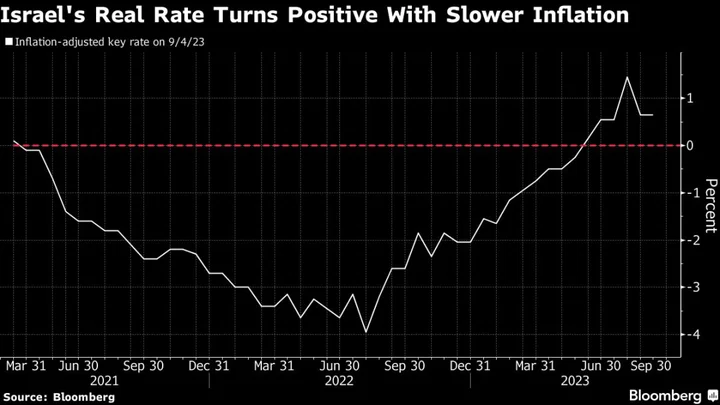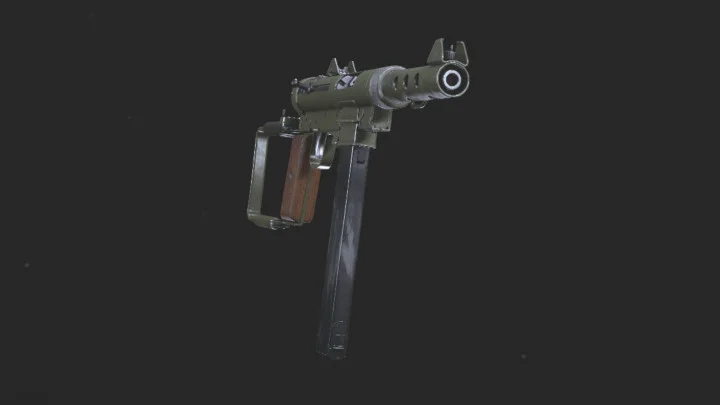Israel is set to offer its first accounting of the toll on the economy from the violent conflict with Hamas, as the central bank reviews interest rates just over two weeks after attacks by the militant group forced emergency measures to stabilize markets.
Updated forecasts from the Bank of Israel’s researchers will accompany a rate decision on Monday that almost all economists predict will extend a pause in place since July. The benchmark has stayed at 4.75% for two straight meetings following 10 hikes that started early last year when rates were near zero.
But with the shape and duration of the war unlikely to become clear any time soon, the assessment can provide a clue to the course of monetary policy after the deadliest assault Israel has suffered in decades.
Israel is now reckoning with the economic costs of a crisis that jarred markets from bonds to stocks and prompted unprecedented interventions by the central bank with a pledge to sell as much as $30 billion to support the shekel. The priorities that emerged mean policymakers will probably sidestep rate cuts for now to avoid more pressure on the currency, even with borrowing costs currently at their highest since 2006.
“If the bank foresees substantial economic effects, investors may be inclined to seize opportunities in down markets,” said Ronen Menahem, chief markets economist at Mizrahi Tefahot Bank. “This will determine the direction in which stock, bond, and foreign exchange markets go.”
Under the central bank’s previous outlook in July, its forecasters saw slower inflation than first anticipated and faster growth of gross domestic product this year. The projection also showed the key rate averaging 4.75%–5% in the second quarter of 2024.
The scenario assumed an amicable resolution to the government’s controversial effort to reduce the power of the courts, but warned it represented a “main risk.”
Bank of Israel Research Department Staff Forecasts in July
While the shekel’s declines first began months ago with the government’s judicial push, the shock of the conflict has accelerated its depreciation to the weakest levels in eight years.
The shekel has dropped every day since the Oct. 7 raid by Hamas killed hundreds of Israelis and prompted retaliatory strikes on Gaza. It’s among the world’s worst performers this month with a loss of almost 6% against the dollar.
As Israel geared up for a ground offensive in Gaza last week, Deputy Governor Andrew Abir said the monetary authority’s top priority was to stabilize the shekel, prompting analysts and traders to review their expectations that monetary easing could be in the cards.
The government is meanwhile planning a massive wartime stimulus program, with the budget deficit possibly widening this year to 3.5% of GDP.
Among the economists surveyed by Bloomberg, only Gil Bufman of Bank Leumi predicts a cut by a quarter percentage point on Monday, though others like strategists at Deutsche Bank AG don’t rule out a small reduction. Central bank Governor Amir Yaron will hold a briefing after the rate announcement scheduled for 4 p.m. local time.
“The situation remains fluid and uncertain, which means that the Bank of Israel could bring rate cuts forward should the projected negative impact on growth become more prevalent or longer-lasting than immediate FX depreciation risks,” Morgan Stanley analysts including Georgi Deyanov and Alina Slyusarchuk said in a note. The Wall Street bank moved its expectation of a first cut to January next year.
Though policymakers have pointed to the shekel’s depreciation as the main inflationary risk, the war could bring huge disruption to the economy that would hold back consumer prices by crimping consumer demand for goods and services.
After hitting the fastest since 2008 at the start of the year, inflation has slowed almost every month since then to reach an annual 3.8% in September. The conflict will likely create “offsetting effects” on prices, according to Bank Leumi, which predicts the central bank will cut rates by “a limited degree” at one of its coming meetings.
“The purpose of the rate cut will be to support households, as well as the business sector, during this time of war, in light of the high degree of uncertainty,” analysts at the capital markets division of Bank Leumi said in a report.
--With assistance from Joel Rinneby.









